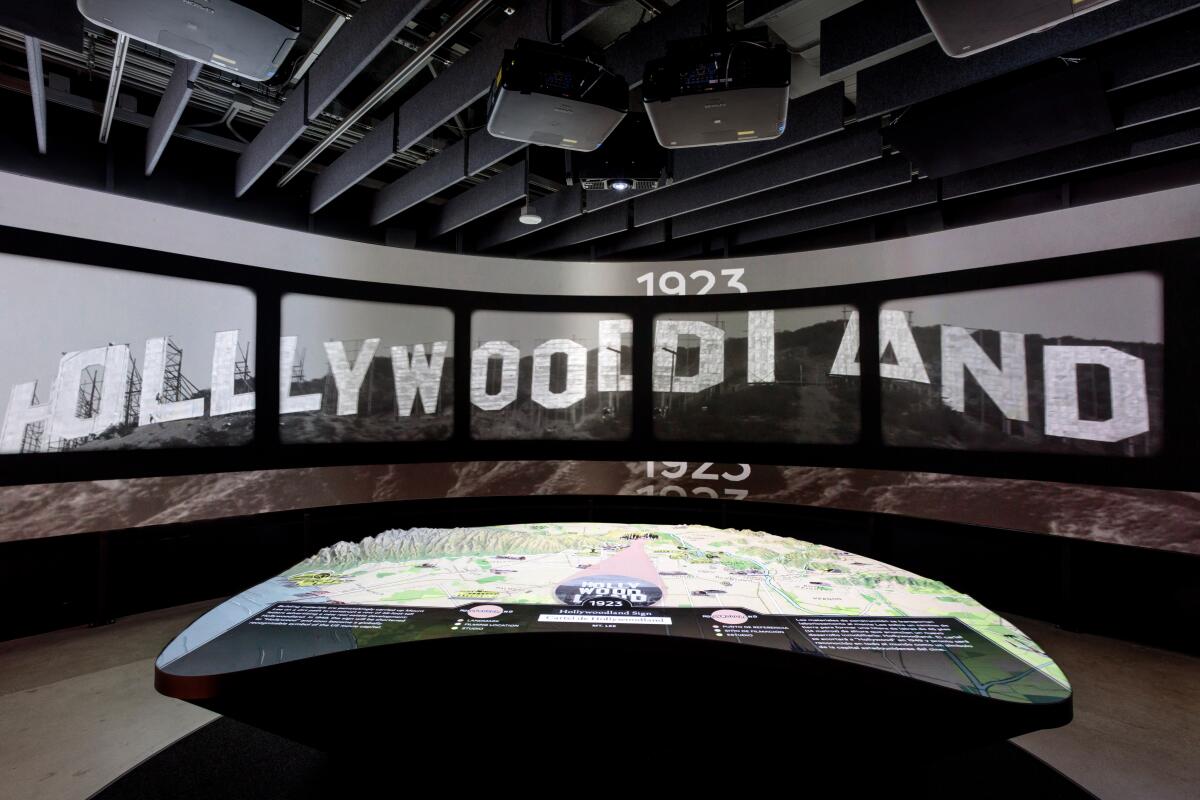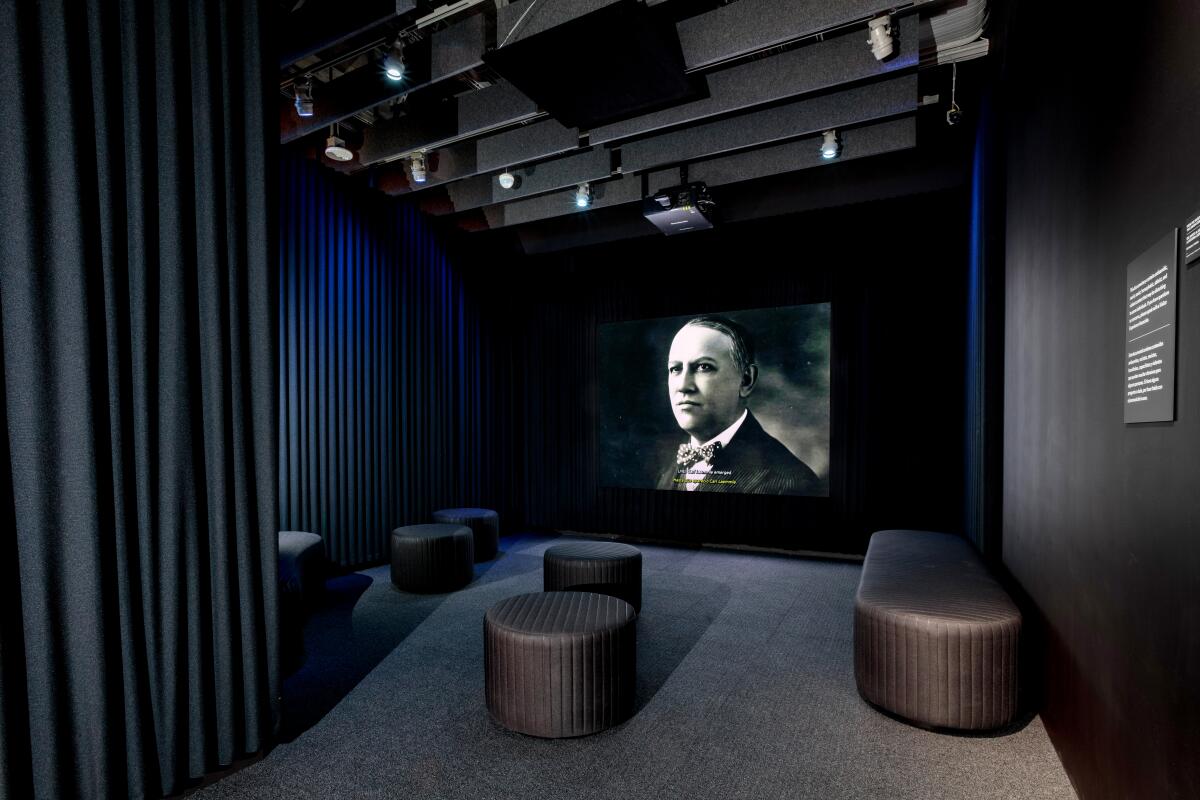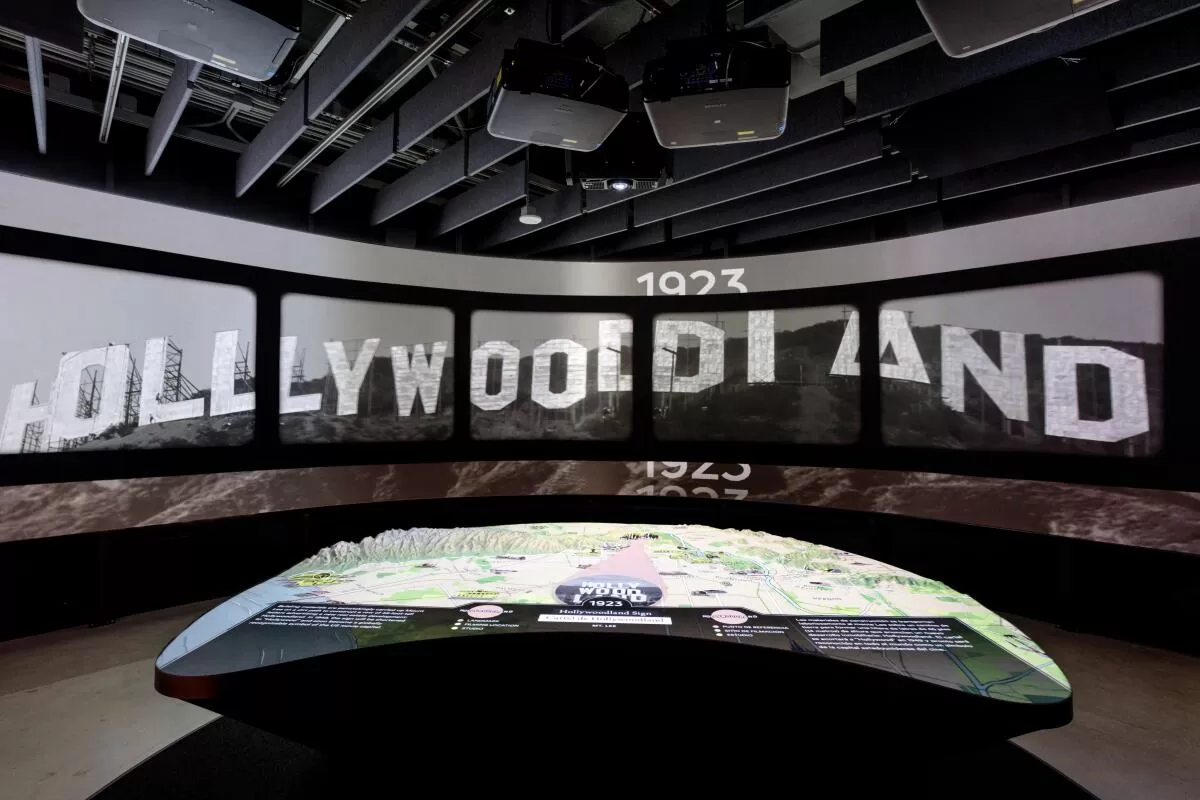The exhibition, titled “Hollywoodland: Jewish Founders and the Making of a Movie Capital,” spotlights the key role of Jewish immigrants such as Harry Cohn, Louis B. Mayer and Samuel Goldwyn in establishing the film industry. The museum, designed to celebrate Hollywood’s rich and complex history, had faced fierce criticism when it opened in 2021 for leaving out Hollywood’s Jewish roots — an omission that it spent more than two years working to address with a permanent exhibition.
But soon after the new exhibit opened, some within the industry’s Jewish community criticized it as a skewed and overly negative portrait of Hollywood’s Jewish moguls, one that perpetuates antisemitic stereotypes.
On Monday, a group called United Jewish Writers sent an open letter to the museum objecting to the use of words such as “predator,” “tyrant,” “oppressive” and “womanizer” to describe the Jewish executives in the exhibit, suggesting that they were being held to an unfair standard.
“It is the only section of the museum that vilifies those it purports to celebrate,” reads the letter, which had garnered some 350 signatures as of Monday, including actor David Schwimmer, writer Amy Sherman-Palladino and sports and entertainment executive Casey Wasserman. “While we acknowledge the value in confronting Hollywood’s problematic past, the despicable double standard of the Jewish Founders exhibit, blaming only the Jews for that problematic past, is unacceptable and, whether intentional or not, antisemitic.”
In response to the growing outcry, which included a string of angry letters to academy leadership, the Academy Museum said in a statement Monday that it would take immediate steps to address the criticisms.
“We take these concerns seriously and are committed to making changes to the exhibition to address them,” the museum said, adding that the first set of changes would be implemented “immediately” in order to “tell these important stories without using phrasing that may unintentionally reinforce stereotypes.”

(Joshua White / JWPictures / Academy Museum)
The controversy over the exhibition comes just weeks after the academy announced the departure of the museum’s director and president, film historian Jacqueline Stewart, who will return to teaching at the University of Chicago. Neither the museum’s newly appointed director, Amy Homma, nor the Hollywoodland exhibit’s curator, Dara Jaffe, were immediately available for further comment.
Lawrence Bender, a prolific film producer whose credits include “Pulp Fiction,” “Inglourious Basterds” and “Good Will Hunting,” was among those who signed the open letter, saying he was deeply disturbed by the exhibit’s repeated focus on the supposed moral failings of the early Jewish film executives.
In one instance, the exhibit notes that Columbia Pictures founder Cohn’s office was said to be modeled after that of Benito Mussolini, associating the mogul with the fascist Italian dictator. “I felt like, ‘Wow, this is what they’re choosing,’” Bender said. “It was a short little paragraph and they can’t help but describe the negative parts of their personal lives.”
“These guys were the creators of our industry, these are incredible movies made over the years, but there is no love or joy in filmmaking, nothing about the fact these guys built this incredible world,” Bender added.
To Bender, the placement of the relatively small, dimly lit exhibit on the museum’s top floor “feels like back in the old shtetl days, a Jewish ghetto.” “People in the movie business know how to be creative and the rest of the museum is done so beautifully,” he says. “This is done so terribly. This is not unconscious.”

A video narrated by Ben Mankiewicz introduces the exhibit.
(Joshua White / JWPictures / Academy Museum)
Veteran TV writer and producer Barry Schkolnick, whose credits include “L.A. Law,” “Law and Order” and “The Good Wife,” also signed on to the letter decrying the exhibit. Visiting the exhibit recently, Schkolnick says he was dismayed by its accompanying 30-minute documentary, “From the Shtetl to the Studio: The Jewish Story of Hollywood,” which he says unjustly projects current attitudes around issues of race, gender and other social concerns onto Hollywood’s founders.
“There was an implication that these Jewish founders were responsible for all the ills of Hollywood,” says Schkolnick, who found the exhibit’s tone starkly at odds with other current exhibits celebrating “The Godfather” and the work of director John Waters. “To graft 2024 into a piece about the 1930s and ‘40s, including using words like ‘ableism,’ just made no sense to me. It felt like a cheap shot.”
The exhibit has also received some positive reviews, including in Jewish publications. Sharon Rosen Leib, great-granddaughter of former Fox Film production chief Sol M. Wurtzel and a consultant on the exhibition, wrote in the Forward that it “captures the founding Jewish moguls’ humanity with wide-angle nuance and empathy.”
For the academy, the controversy highlights the ongoing challenges it has faced in trying to present a single, unified version of Hollywood’s history that is palatable to everyone. During the museum’s long, often difficult development, the organization wrestled with thorny questions of whose stories would be told and how the film industry’s own historical problems with racism and sexism would be reflected — an issue of ever greater urgency in the wake of #OscarsSoWhite and the #MeToo movement.
Ultimately, 17 task forces were formed to represent each of the academy’s branches — from acting and directing to executives and public relations — in developing the exhibitions. An Inclusion Advisory Committee was charged with helping spotlight the work of diverse filmmakers and expose historical omissions.
In recent weeks, amid the growing criticism over the Hollywoodland exhibit, one member of that committee, Israeli American director Alma Har’el, resigned. Har’el declined to comment on her resignation.
The Hollywoodland exhibit drew inspiration from the work of cultural historian Neal Gabler, whose 1988 book “An Empire of Their Own: How the Jews Invented Hollywood” is considered the definitive work on the industry’s Jewish founders. Gabler served as an advisor on the exhibition and spoke and signed books at its opening but was not immediately available to comment on the criticisms of the exhibit.
The museum itself has drawn significant backing from some of Hollywood’s most powerful Jewish figures, including Steven Spielberg, whose name adorns a gallery on the first floor, and Israeli American businessman Haim Saban, who donated $50 million to complete the construction.
To address the criticisms, the museum said it is “convening an advisory group of experts from leading museums focused on the Jewish community, civil rights, and the history of other marginalized groups to advise us on complex questions about context and any necessary additions to the exhibition’s narrative…. We are deeply committed to telling these important stories in an honest, respectful, and impactful way.”
Speaking to The Times on Tuesday in the wake of that announcement, Bender said he remains skeptical.
“I’m not holding my breath,” Bender says. “It’s not like the exhibit is a little thing. It needs a major overhaul and someone needs to do it who really believes in the love of cinema and the people who created this business… I don’t get the sense they really care. I feel like they’re trying to placate people.”
